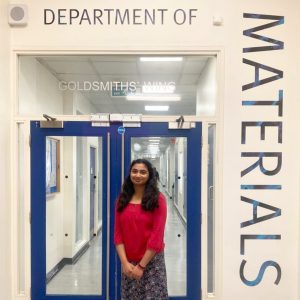by Anjali Devadasan
To give you an insight into the fascinating world of Materials Science and Engineering, here are 5 essential skills we apply during the course:
Innovation
What is true innovation? It’s when you take action and implement your brilliant ideas. During the Design Study project in the first year, we had the opportunity to innovate. Once we gained the foundation abilities involving engineering drawings, SOLIDWORKS, and Arduino in the autumn term, we were introduced to the brief: ideate, design, test, and fabricate a working rheometer. Many of us had no idea what a rheometer was (a machine that measures viscosity). Despite this, we managed to work together, test, learn from failures and retry ideas to eventually build our own rheometer by the end of the year.
Problem Solving
An integral part of the entire course is enhancing our problem-solving ability. In the first and second years, we had a coding challenge. Many of us had limited, if not non-existent, coding knowledge, but we were again taught the fundamentals to then dive into the deep end. In the first year, the coding challenge involved modelling the kinetics of polymerisation and last year; the task involved building a classifier to predict the crystalline structure of perovskites. Both tasks were challenging and outside of our comfort zones. Still, we tackled the problem by strategically breaking it down into manageable parts and being motivated to figure out how to make the code function successfully.
Agility
For this course, it is important to be agile in terms of learning. There is much variety, one morning, you could learn about Bioglass, and in the same afternoon, you could do a nanomaterials lab. One week could involve calculus, lab work, mechanics, crystallography, thermodynamics, magnetism and Design Study in the first year. Therefore, we quickly learn to adapt our brains to switch between these topics and learn effectively from lectures, tutorials, labs and Design Study sessions. During the COVID lockdowns, we discovered ways of working better suited to online and hybrid working. The Materials community proactively shares ideas and experiences to find opportunities to try things differently.

Critical Thinking
Whether it is a tutorial, lecture or research, we are encouraged to develop our critical thinking abilities. It’s helpful to come to a reasonable conclusion by reflecting on an idea or problem, including the different arguments and making logical connections between ideas. Sometimes that may be to decide whether titanium is a suitable material for a particular implant or to decide about a project idea suggested by someone in your Design Study group. While approaching problems systematically, we need to identify inconsistencies/errors, question assumptions and apply reason to justifications.
Collaboration
Collaboration is a key element of the course. The coding challenge, many labs and Design Study projects all involve working together as a team. For the Design Study, we were in a “company” of 10, with roles including Director, Chief of Production, Chief Engineer, etc. Everyone was responsible for ensuring we stayed on track with our project, shared ideas and combined expertise. This also improved our communication skills and effective working, as we could split the tasks and help each other. The coding challenge was in groups of 3 or 4, which created a motivating environment for everyone to learn, stumble (due to unknown stubborn errors) and try again together.
Overall, the topics and tasks are exciting and challenging to push you out of your comfort zone and continue to learn. You learn a lot during the course, which proves helpful in shaping your skills to be ready for the real world.

